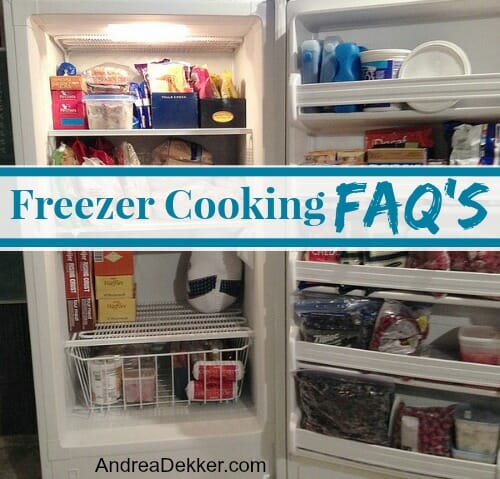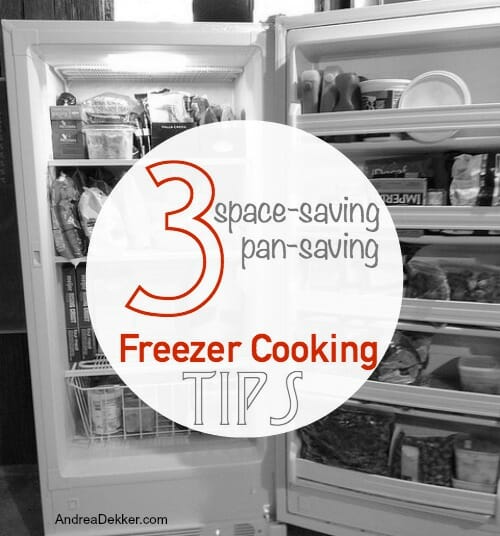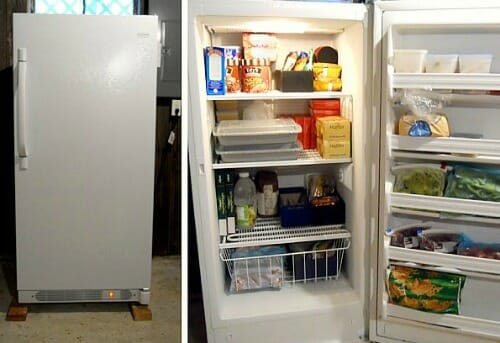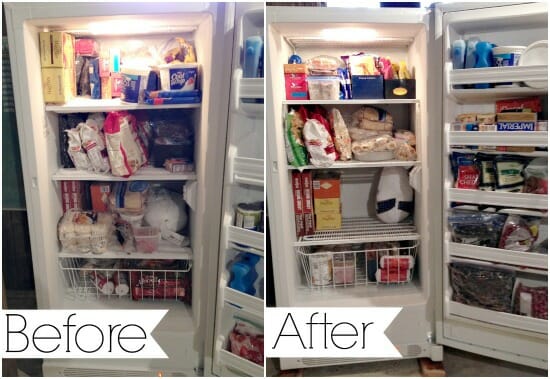
Almost exactly 5 years ago, I shared a post about various different foods that I freeze. At the time, the post was very last-minute and unplanned… I wasn’t even sure if anyone would be interested in knowing what I put in my freezer!
However, over the past 5 years, that post has consistently been one of the most popular posts on my site. It has been shared thousands of times on Facebook and Pinterest and rarely a week goes by that I don’t get more comments and emails regarding that blog post. HUNDREDS of questions about what to freeze, how to freeze, how to defrost, etc. etc. etc.
I feel like that one post somehow turned me into a “freezer food expert” in the eyes of the internet — and while I appreciate the extra blog traffic, I will be the first to admit that I am NOT a freezer food expert.
Yes, we eat freezer meals and baked goods a on a very regular basis, but that doesn’t mean I always do everything “right” or even that there is an official “right way” to put food in the freezer! However, since I get so many questions about freezer cooking, I thought I’d put some of my thoughts and “answers” together in an official blog post.
I should probably mention that Dave and I are not extremely picky about our food. We’ll eat slightly freezer-burned meat, we’ll eat slightly mushy pasta, we’ll even eat meat that’s a bit dry if we have to. If you ARE quite picky about the taste and texture of your food, you might not agree with all the suggestions I make below… that’s fine!
Can I freeze _________?
If I had a nickel for every time someone has emailed me or left a comment asking if they can freeze a certain type of food… I’d be rich!
And even though I’ve frozen lots and lots of different foods, I’m not always able to answer this question with 100% certainty. In my opinion, you can almost freeze anything… so just give it a try!
Ok, I suppose things like lettuce probably won’t freeze well (unless you want to use it for a smoothie). Also, I haven’t had great luck with cooked potatoes as they seem to get quite mushy and/or watery after they defrost.
My advice to you is simply try freezing a small batch of whatever food you’re wondering about. This way, you’ll be able to see first-hand if it works well for you and you won’t waste much food. Also, try doing a Google search for “how to freeze ______”. You’ll most likely find what you’re looking for!
.
How should I package _____ for the freezer?
This is another very popular question I’ve gotten over the years… and once again, I don’t have a clear answer. Personally, I use all kinds of containers and tools to freeze food — just based on what I have on hand.
I like to use square and rectangle containers as much as possible because they stack better and take up less space than round and oval containers (I really like these containers). I also use lots of freezer bags to store broth, stock, sauces, chopped veggies, chopped fruits, sliced and shredded cheeses, ground and shredded meats, etc. The bags stack nicely and hardly take up any space. Plus, I can use different size bags to pre-portion out the amount I need for various recipes (example: 2 c. of broth or 1 lb. ground beef).
I use mostly plastic containers — just because I have more of them, but glass works fine too as long as you leave room for expansion.
I put bread and buns from the store right into the freezer and don’t even take the time to double bag them. We do not feel like our bread every tastes stale or freezer burned… but like I mentioned above, we’re not super picky.
Whenever I freeze full meals, I follow these tips to save freezer-space (and my pans).
Should I cook and/or bake _____ before I freeze it?
Well, this depends…. (and don’t stress, because most times you’ll be fine either way)
If I’m making any sort of soup, stew, casserole, pasta dish, enchiladas, or other “full meal” I cook the ingredients and fully assemble the meal — however, there’s no need to actually bake the finished product in the oven until you’re ready to eat it. For example, if I was making lasagna to put in the freezer, I would boil the noodles, cook the meat/sauce and fully assemble the meal — but I wouldn’t actually bake it in the oven until after I defrosted it on the day we were planning to eat it.
That said, I have also frozen fully cooked lasagna many times. In fact, I just did this 2 weeks ago after making a big batch of lasagna. We ate it for dinner (with company), then had leftovers the next day for lunch. Then I put the rest of it in the freezer for about 20 minutes (just to firm up), cut the partially-frozen lasagna into individual serving sizes, and froze each serving in a zip-top bag for easy lunches.
When it comes to baked goods, I usually bake them before I freeze them — because we like to just pull a handful of various goodies out of the freezer throughout the week. Baked cakes, cupcakes, cookies, bars, brownies, etc. all freeze very well — and I almost always frost my cakes and cupcakes before I freeze them!
But again, there are PLENTY of times when I freeze raw cookie dough (either in containers or in pre-made balls) so we can have “freshly-baked” cookies right from the freezer — so again, there really is no “wrong” way to do this!
.
How do I defrost _________?
This question surprised me because I’ve never really given much thought to the defrosting process. But since this was the #2 most-asked question I received, it deserves a response!
Basically, whenever I defrost any breads, muffins, baked goods, baking supplies, candies, cookies, chips, or other pantry items, I just pull it out of the freezer and let it sit on the counter or in our cabinets until it defrosts… and then we eat it.
However, when it comes to dairy products, meat, and other refrigerated items, it’s best to defrost them in the refrigerator. If you’re just defrosting a package of cheese, it will probably be defrosted in a couple of hours. If you’re defrosting a 9″ x 13″ casserole dish or large containers of soup, it will take much longer. I usually try to pull anything I’ll need for dinner out of the freezer the night before.
I’ve definitely forgotten to pull items out of the freezer on time, and then I just resort to defrosting it on the counter. This is not recommended, but I’m just being honest here! We’ve never been harmed or gotten sick by eating food that was defrosted on the counter.
.
How long will ______ last after it’s defrosted?
This depends on the type of food.
For example, if you freeze and defrost chicken or milk, it might only last a week until it needs to be cooked or consumed. However, chips, crackers, or nuts should taste fresh for several weeks after they are defrosted.
Basically, I would use common sense and realize that if a food has a pretty long shelf life {crackers and chips} before you freeze it, it should stay fresh for a long time after you defrost it. And if it has a shorter shelf life {milk and chicken} then it probably won’t last as long after you defrost it.
Make sense?
What type of freezer should I have?
First of all, please don’t go out and purchase a new freezer just to start freezer cooking. If you package your items properly, you can fit A LOT of food in the freezer attached to your refrigerator.
However, if you are already in the market for a freezer, I would most definitely recommend a manual-defrost freezer {NOT a frost-free freezer}. Your food will stay fresher longer and you won’t have to deal with as much freezer burn.
Also, my personal preference is an upright freezer because they are easier to organize and see what you have. But you can actually fit more food per cubic foot in a chest freezer — plus, chest freezers are often a bit cheaper.
.
How often do you defrost your freezer?
We honestly don’t have a set “schedule” — we just do it whenever it needs it. It usually works out to be every 2 years. It’s actually on our to-do list right now, as we’re hoping to do it while it’s still quite cold outside (so our food doesn’t defrost as quickly).
Here’s a full post where I shared all the in’s and out’s of how we defrost our freezer.
A few more tips:
- Label and date EVERYTHING you put in the freezer (I promise, you won’t remember what it is if you don’t label it)
- Just try it! In my experience, you can freeze almost anything, so just be adventuresome and give it a try.
- Think about portions — if you only use 1c. of ground beef or ground chicken at a time, then freeze it in 1c. portions. If most of your recipes call for 2c. of broth, then freeze it in 2c. portions. Your food will defrost quicker this way and you won’t have to deal with re-freezing the leftovers.
- Be frugal. Freezer cooking doesn’t have to be expensive — in fact, it’s actually a great way to save loads of money on groceries! Just start with the freezer you already have, use containers you already have, and stock up on food when it’s on sale.
- Start small. You do NOT need to invest a ton of time or money into freezer cooking. Just try freezing one or two meals, one batch of cookies, or one package of rolls. See if you like it and then go from there.
- Keep reading! If you’re looking for more of my freezer-cooking tips and tricks, here’s the link to ALLLLLLLL my freezer-cooking posts for the past 6+ years!
One final thought:
From a personal standpoint, I’ve saved so much time and money by utilizing my freezer and making meals in advance — I honestly can’t imagine NOT having a fully stocked freezer to rely on when I need a quick dinner or we’re asked to bring a treat to work/church/friend/family parties.
I guess that’s why I’ve enjoyed sharing so much about freezer cooking here on my blog. It has really played a crucial role in my ability to simplify meals in our house, and with 3 little kids who LOVE to be by mom when I’m in the kitchen, I’ll take all the help I can get.
HOWEVER, if you don’t like freezer cooking… then don’t do it! I know this might sound silly, but it’s not for everyone, and there is certainly no need to stress out about it or push yourself to do it if you don’t enjoy it or benefit from it.
.
OK, there you have it.
I’ve tried to cover the main questions I’ve been asked over the last year — but feel free to leave additional questions in the comments below. I’ll answer as many as I can, and other readers might be able to answer the rest!




David and Debbie Sharp says
can you freeze jar oyster and put them in a freezer bag ? until christmas
Andrea says
I’ve never even eaten an oyster, let alone tried to freeze them — so I couldn’t tell you 🙂
My advice is always just to “give it a try” and you’ll find out.
put a few in the freezer today and take them out again this weekend. See if you like them. If so, then yes, you can do it for Christmas!
Susan says
I cook & bake in quantity and use bags for bread, cookies etc. For make ahead dinners, sauces, meats, cheese etc I use vacuum seal bags and find that they last longer and defrost fresher than zip loc bags or containers that have air in with the food. Regards
Lynn says
You can freeze potato chips. I didn’t believe this until I tried it but it works. Chips get stale so quickly, and we don’t eat them very often so we just take out the serving and return the securely closed package to the crib until next time we want a few.
Nicolle says
Can I freeze terampusi cake?
Christine @ The (mostly) Simple Life says
I love having a full freezer! If I’m not sure if I can freeze something I just try it. I buy shredded cheese in bulk at Sam’s Club and freeze that in smaller portions. Plus meats and soups and casseroles. It makes for easier meals when you just have to think ahead enough to thaw something!
Andrea says
yes, Just try it!
I wish more people were more adventuresome and not so worried about making a potential “mistake”.
Roxie says
My mother is the freezer queen! Sooo many people call her to ask if something can be frozen – and she knows! But here’s a funny for you. Several years ago, we had left over lentil soup and put it in a freezer storage container and labeled it so I could have it for my lunch.
Fast forward a couple of years and I went to the freezer to find some soup on one of our colder days, I pulled out the container labeled ‘lentil soup’ and was so excited at the thoughts of a nice, warm lunch. I let it thaw during the day and at lunch time, I took the lid off….only to discover that it was CHICKEN BROTH. I immediately remembered thinking that I would remember (bad plan, I know) that the container labeled ‘lentil soup’ was actually chicken broth but I did not.
I say all that to say if you put something in the freezer – label it correctly to make sure you don’t get surprised. For many years we did not label our leftovers, I merely had a mystery lunch and it was honestly kind of fun. But the chicken broth episode taught me a valuable lesson about proper labeling!
And by the way….I did save the chicken broth to be used in another recipe. No waste!
Siobhan says
I want to know “I have veg in the freezer I want to make veg soup with. I then want to freeze the soup. My question is can I freeze veg that has already been frozen
Andrea says
yes, that should be fine!
Heather Morgan says
I noticed the the first comment here by Melissa mentions the disposable dollar-store casserole pans for freezing casseroles. Is that what you do also? I just assume it’s easiest to freeze and cook your casseroles in the same dish–and was wondering if you just use the disposable pans or something else. Also, I know you say you defrost a lot of stuff, but do you ever just cook your casseroles from frozen? I mean plenty of store-bought type casseroles, lasagnas, etc. come already frozen so I assume it’d be okay. Have you figured out the average time to add onto a regular recipe if you’re cooking it frozen instead?
Elaine Bell says
Can I freeze boiled eggs? Sam’s sells BIG bags of boiled eggs and they would ruin before I get to the bottom?
Leah says
Thanks for this comprehensive, reader-friendly info!
I reuse freezer bags. Why? Because I hate adding to the Texas-sized rafts of plastic waste floating in the oceans. (check it out — 5gyres.org.)
Washing bags is a pain. I don’t even know if it takes more fuel to wash freezer bags than to buy new ones. But plastic waste is something that anybody who freezes food needs to be aware of.
And recycling metal is super important. Just think of those hideous ore mines.
There’s nothing “re” about this precious resource, unless we “re”cycle it. Bits of foil, aluminum trays, keys, cans — everything!